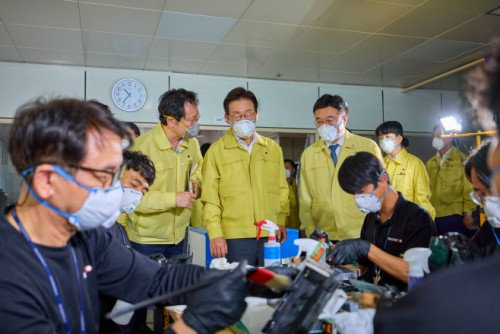 |
| President Lee Jae-myung inspects recovery work at the National Information Resources Service in Yuseong-gu, Daejeon, on October 10, following a fire that disrupted the government’s central data system. / Source: Yonhap News |
As South Korea returns from the long Chuseok holiday, President Lee Jae-myung faces a daunting list of pending state affairs — from restoring the nation’s damaged data infrastructure to resolving trade tensions with Washington and steering the upcoming APEC summit amid rising U.S.-China friction.
The government’s top priority remains the restoration of the National Information Resources Service (NIRS) facility in Daejeon, which was crippled by a major fire on September 26. Although emergency recovery work is underway, full restoration and prevention measures have yet to be completed.
President Lee, who kept public activities to a minimum during the holidays, nonetheless received regular briefings and personally visited the NIRS site in Yuseong District on October 10, urging officials to “ensure both a swift recovery and a watertight prevention plan.”
According to the presidential office, the AI Infrastructure Governance and Innovation Task Force, established after the fire, held continuous meetings throughout the break — one in person and several online — to analyze the cause, develop short-term recovery measures, and craft long-term reforms for the national IT governance system. The task force plans to unveil a mid- to long-term digital infrastructure overhaul in November.
Presidential aides say the initiative will not stop at physical recovery but will involve a “complete review and redesign” of how the national information system has been managed and governed over decades.
Another major challenge for President Lee is the stalled tariff negotiation with the United States. Washington is reportedly pressing Seoul to execute its $350 billion investment pledge in cash, while South Korea insists that such a demand is unrealistic and continues to push for an “unlimited currency swap” as a prerequisite for any broader deal.
Talks were held on October 5, 7, and 8, with senior presidential secretaries and relevant ministries convening again on the 9th to explore a breakthrough. However, a senior official said it is “too early to speak of any dramatic turnaround.” The presidential office remains cautiously optimistic that the issue could see movement during the upcoming APEC summit — though many observers expect tough negotiations ahead.
Presidential Senior Secretary for Political Affairs Woo Sang-ho acknowledged the difficulties in a radio interview on October 6, saying, “The talks are extremely tough — it feels like we’re starting over every time.”
Lee also faces the diplomatic test of ensuring a successful APEC summit later this month, where tensions between the U.S. and China are again escalating. With China’s rare-earth export curbs and Washington’s plan to impose 100% tariffs on Chinese goods, the prospect of a Trump–Xi meeting remains uncertain. President Trump said on October 10, “We might not have that (meeting), but I’m going there (to Korea) anyway,” casting doubt on whether the bilateral talks will occur during the summit.
If the U.S.-China summit fails to materialize and trade hostilities deepen, it could jeopardize the Lee administration’s plan to use APEC as a platform to ease global trade frictions and improve security stability in Northeast Asia. A presidential aide told this newspaper the office “will not issue any separate comment on President Trump’s remarks,” signaling a cautious diplomatic stance.
Most Read
-
1
-
2
-
3
-
4
-
5
-
6
-
7





















